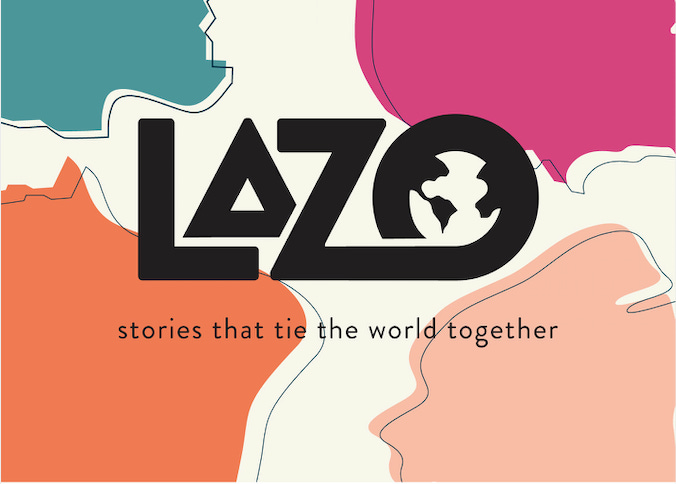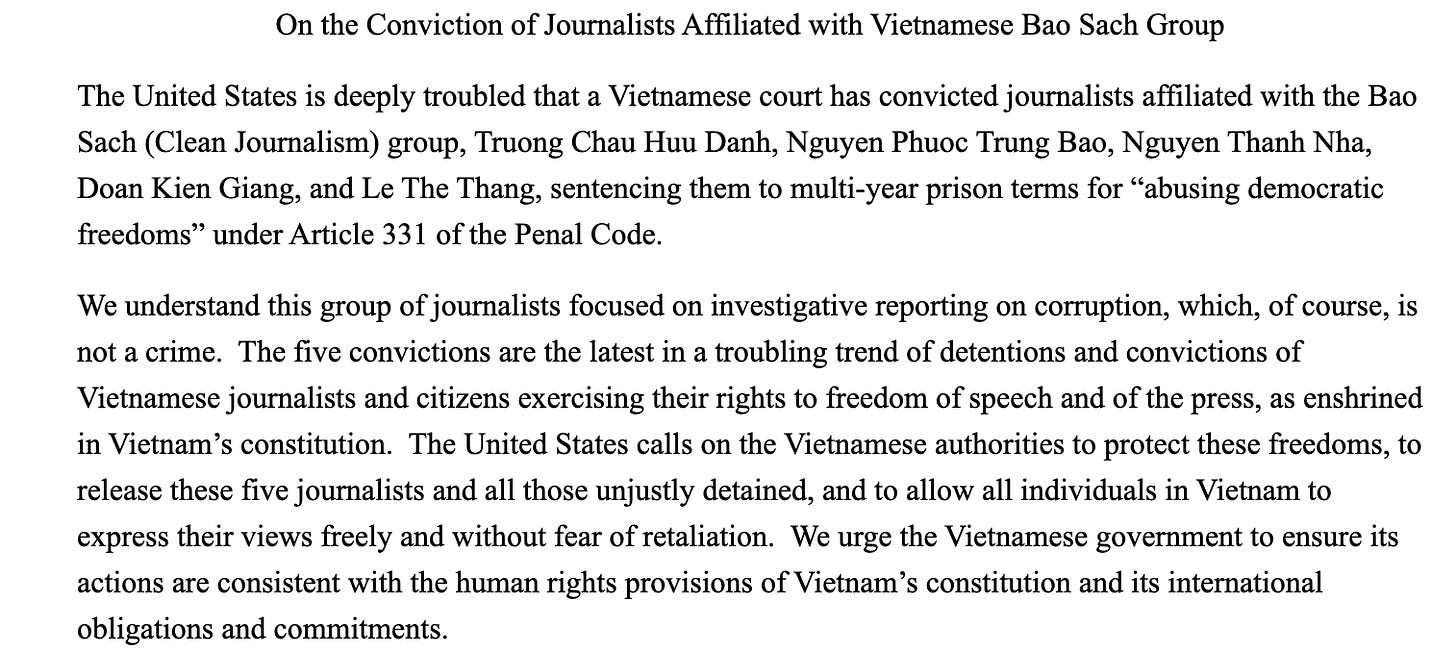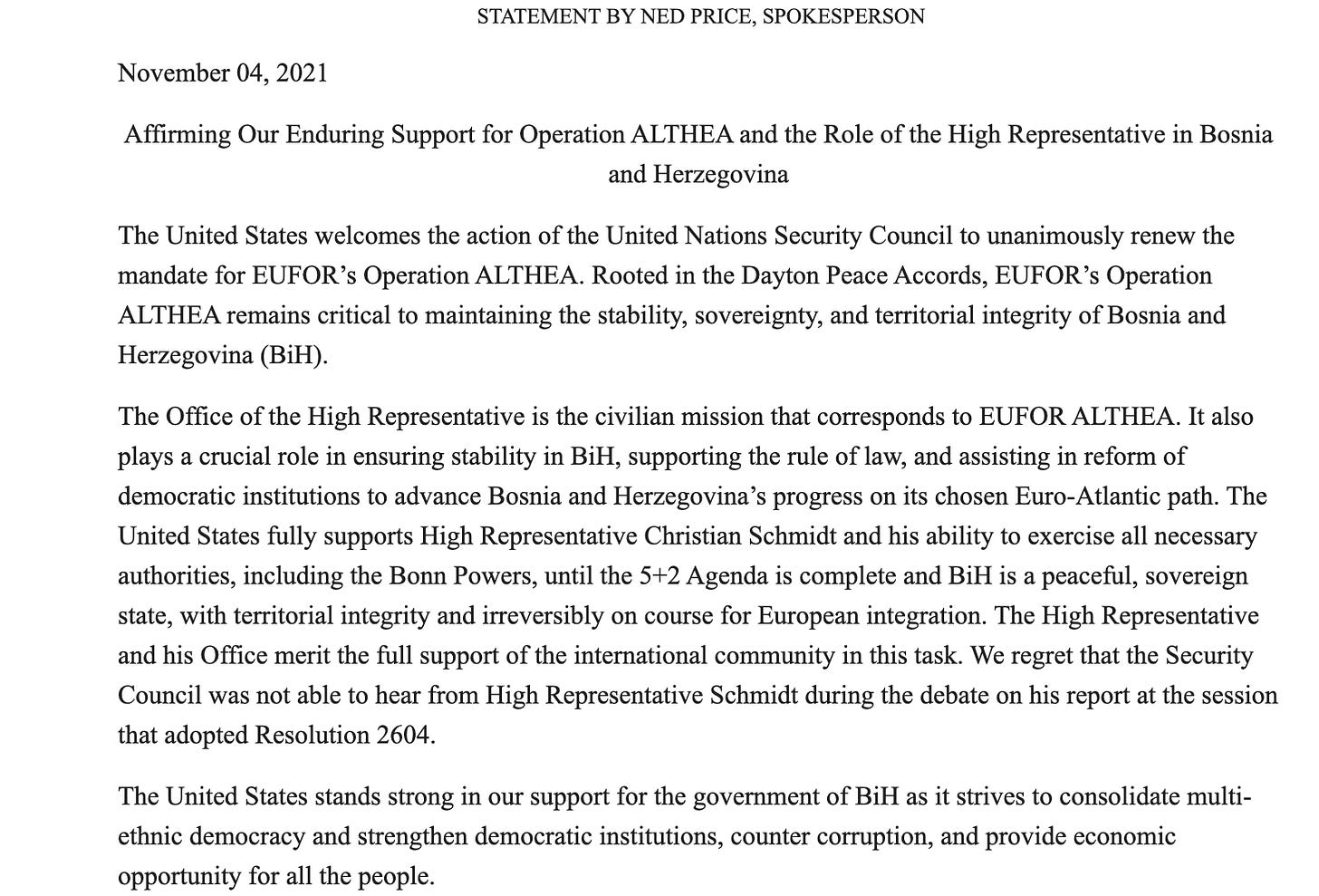On Western Sahara.
Hello, all! I hope you're enjoying your Sunday, or sleeping, or something. This week I spoke to a handful of experts for an article on the Biden administration's policy towards Western Sahara, a former Spanish colony Morocco annexed in 1975. Former President Trump made the controversial decision to recognize Morocco's claim over the territory last year, and so far President Biden has not reversed the policy.
Observers often think of Western Sahara as a frozen conflict. Still, the conflict between Morocco and the Polisario Front, which is fighting for Western Sahara's self-determination, has been active again since November 2020.
Much of the conversations I had on the topic didn't make it into the final article (which you should read!), so I'll share here snippets of my exchanges with Stephen Zunes, a professor of politics at the University of San Francisco and author of a book on the conflict, Samuel Ramani, a scholar at the Royal United Services Institute for Defence and Security Studies, and Ambassador Ouibi Bachir, the Polisario Front’s representative to the European Union.
Before we launch into the interviews, a little housekeeping: I'm adding a new section this week (at the very bottom) with statements from the State Department that might be of interest. And as always, please send story tips or recommendations to c.maza@protonmail.com. And don't forget 👇👇
Upgrade to a premium subscription by Clicking Here.
Cristina: How do you assess the Biden administration's policy toward the region?
Stephen Zunes: The overriding issue regarding U.S. policy in the region is the continued fallout from Trump’s recognition of Morocco’s occupation of Western Sahara. The United States is the only major country to do so.
The African Union recognizes Western Sahara as a full member state, so the United States is currently recognizing the forcible takeover of one recognized African state by another, which is damaging U.S. relations with several African countries. In addition, by effectively recognizing the expansion of a country’s territory by force, a clear violation of the United Nations Charter, it diminishes U.S. credibility in opposing the Russian takeover of Crimea or other similar acts of aggression.
Cristina: How do you assess the language in the recent UN resolution to renew the peacekeeping mission in Western Sahara?
Stephen Zunes: MINURSO is the only modern UN peacekeeping operation that does not have a human rights mandate. Repeated efforts to include human rights monitoring in both Moroccan-occupied territory and Polisario-controlled areas such as the refugee camps have been blocked by France.
While Morocco itself is not as repressive as some states in the region, the human rights situation in the occupied territory is dire. Freedom House ranks occupied Western Sahara as among the “worst of the worst” along with such countries as Tibet, North Korea, Syria, and Tajikistan. Speaking personally, I’ve been to over 85 countries — including Iraq under Saddam and Indonesia under Suharto — and I’ve never seen a worse police state than Moroccan-occupied Western Sahara.
Cristina: How do you assess the Biden administration's policy toward the region?
Samuel Ramani: The Biden administration, with few exceptions, has largely perpetuated Trump-era policies in North Africa. There was an expectation in Algeria that Biden would be pro-Moroccan and in Egypt that Biden would cool relations with Sisi, but little drastic changes in US policy have occurred. The Biden administration has talked about deepening its involvement in Libya with the appointment of Richard Norland as a special envoy. But these gestures have not led to a drastic expansion of a U.S. diplomatic role in Libya either.
Cristina: Do you expect the Biden administration to reverse the Trump administration's recognition of Morocco's sovereignty over Western Sahara?
Samuel Ramani: The U.S. is very unlikely to unilaterally renege on its recognition of Morocco's sovereignty over Western Sahara even though it is highly controversial. The policy is officially under review, but Antony Blinken made it clear in discussions with Morocco in April that a change would not occur. Biden is trying to insert predictability into U.S. North Africa policy after Trump's erratic positions on Haftar, so breaking with the past policy on Morocco would not fit into the Biden administration's objectives.
Cristina: How do you assess the language in the recent UN resolution to renew the peacekeeping mission in Western Sahara? Was there enough emphasis on human rights?
Samuel Ramani: Human rights was mentioned but in a way that won't inflame Morocco or satisfy the Polisario Front. The main goal of the UN peacekeeping mission is ensuring the ceasefire remains in place, as Morocco-Algeria relations at a broader level have seen a spiral of tensions.
Cristina: How do you assess the Biden administration's policy toward the region?
Oubi Bachir: Regarding the region of North Africa as a whole, I think we are just at the beginning of the Biden administration's first term. We still need time to assess the policy. But if I’m to say something in this regard, I would put special emphasis on the need for the U.S. to learn from the biased and unbalanced approach the EU is adopting regarding the Maghreb. From Brussels and individual countries such as France and Spain, the preference is made all the time for Morocco, a sort of spoiled boy at the expense of the rest. The outcome is there. We don’t think the U.S., and mainly this administration can afford this mistake.
Cristina: Do you expect the Biden administration to reverse the Trump administration's recognition of Morocco's sovereignty over Western Sahara?
Oubi Bachir: We think the Biden administration should reverse the Trump administration's proclamation. It is necessary not only concerning the conflict in Western Sahara and the U.S. position as penholder in the UNSC but also a position that requires a neutral position that has been primarily affected by this unprecedented recognition to the nonexistent Moroccan sovereignty over the territory.
It is also, and maybe primarily especially for the American people, about the U.S. reputation and universal image. There is a need to restore an image that such a decision has tarnished. Nobody would understand why the U.S. sacrificed two of the major founding principles of its foreign policy throughout history to serve a narrow and misled policy. Wilson’s right to self-determination announcement of 1918 and the Stimson doctrine of 1932 on the non-recognition of states created as a result of aggression guided U.S. foreign policy. Trump’s proclamation was not only in breach of the fundamental norms of international law but a frontal violation of the U.S. tradition and legacy.
Therefore, we would instead expect or at least wish Biden’s administration would formally reverse it. We are still waiting for that. Nevertheless, we have to say that since day 1 of this administration, we have been receiving some positive signs in this regard, such as reaffirming the legal status of the conflict and the UN role, the Pentagon and Africom communiqués denying Moroccan propaganda on the U.S. navy presence in Western Sahara and the formal refusal to open a consulate in the occupied city of Dakhla as decided by the previous administration.
Cristina: How do you assess the language in the recent UN resolution to renew the peacekeeping mission in Western Sahara? Was there enough emphasis on human rights?
No emphasis on human rights, and the MOINURSO still holds the shameful reputation of being almost the only UN mission with no mandate on human rights because of the potential French veto from within the UNSC and the hysteric rejection and phobia from Morocco.
Since the Security Council chose to continue to be on the logic of business, as usual, there's no surprise in this regard. The previous UNSC resolution 2602 (2021) is indeed another missed opportunity to bring back the UN-led process back on track.
Our immense frustration is that both in substance and in the form, the resolution failed to address, or at least reflect the drastically new reality on the ground since the collapse of the ceasefire in November 2020. The approach is the same, managing the conflict, not resolving it. This approach, from our point of view, is equal to the consolidation of the status quo and, by extension, the Moroccan military occupation of our territory. Such an approach is unacceptable. It is at the origin of the ongoing war and the 30 years of failure of the UN to decolonize the territory.
We thought the collapse of the ceasefire and the dangerous mounting tension in the region would constitute a wake-up call to the UNSC to adopt a new approach, assume its responsibility, identify the obstructive party, and draw the necessary road map to speed up the process based on the only ratified agreement by the two parties Morocco and the Frente Polisario which is the Settlement plan of 1991. Nothing appeared in that sense. On the contrary, the same practices of the past as if the situation remains the same. The intensity of the armed hostilities is not yet enough for the UNSC to take things seriously. In other words, both parties could interpret the resolution as an open invitation to engage in more intensified escalation to get the full attention of the UN supreme body. Pity. In addition, the mission of the incoming Personal Envoy has been largely conditioned by this resolution. His margin of maneuver is almost null.
In case you needed a reminder, the opinions expressed here do not represent my opinions or those of Lazo Letters. This is just an interview.
What I'm writing:
• I looked at the Biden administration's policy towards Western Sahara almost one year after former President Trump made the controversial decision to recognize Morocco's claim over the disputed former Spanish colony. A State Department official told me they are consulting privately with the parties, neighboring states, and international partners about how best to achieve a lasting resolution. Some members of Congress want answers sooner.
• Kazakhstan's justice minister is meeting with members of Congress and pushing for the passage of a little-known bill that would bolster the country’s chances to attract business and investment from U.S. companies.
What I'm reading:
• Igor Danchenko, a primary source for the 2016 Steele dossier of allegations against former President Donald Trump, was arrested on charges that he repeatedly lied to the FBI. You can read the indictment here.
• The Biden administration placed Israeli spyware company NSO Group on a U.S. blacklist after determining that the company acted “contrary to the foreign policy and national security interests of the U.S.”
• Turkish President Tayyip Erdoğan canceled his plans to attend the COP26 climate conference after Britain failed to meet Ankara’s demands on security arrangements, two Turkish officials told Reuters.
• President Biden told Erdoğan that his request for F-16 fighter jets must go through a U.S. process, and he raised the issue of human rights and concerns about Turkey’s possession of the S-400 Russian missile system according to a White House readout.
• Bulgaria is deploying 350 troops and 40 army vehicles along its southern border with Turkey to help border police deal with a growing influx of migrants, the Associated Press reports.
• North Macedonia's Prime Minister Zoran Zaev announced he will step down as both as Prime Minister and leader of the ruling Social Democratic Union of Macedonia (SDSM) after his center-left party suffered defeat in local elections, Politico Europe reports.
• The High Representative for Bosnia and Herzegovina, Christian Schmidt, warned that the country is in imminent danger of breaking apart, and there is a “very real” prospect of a return to conflict, the Guardian reports.
• Bisera Turković, Bosnia and Hercegovina's Minister of Foreign Affairs, told Newsweek that the country must join NATO as soon as possible to avoid war.
• Majda Ruge writes for Foreign Policy that the European Union and the United States need to stop making concessions to Serbian secessionist forces in Bosnia that are backed by Russia.
• A study of weapons and ammunition used in the war in Ukraine has shown a panoply of Russian-supplied arms has helped fuel the war, the New York Times reports.
• U.S. and E.U. officials are concerned about the renewed movements and buildup of Russian troops near Ukraine’s border, the Washington Post reports.
• Far-right groups in Ukraine's capital are planning a march in the nightlife district of Podil that many fear could escalate into a raid on nightclubs, Resident Adviser reports.
• Russia’s Black Sea naval forces practiced destroying enemy targets following complaints from Moscow about the presence of two U.S. warships in the area, Reuters reports.
• The Dutch Supreme Court upheld part of a Russian appeal against a $50 billion arbitration award to former shareholders of oil giant Yukos, quashing a lower court’s decision to uphold the award, the Associated Press reports.
• Poland summoned Belarus’ charge d’affaires, Alexander Chesnovsky, after Belarusian soldiers crossed into Polish territory, Deutsche Welle reports.
• Saudi Arabia banned imports from Lebanon and expelled Lebanon’s ambassador following remarks by an official about the war in Yemen, the Wall Street Journal reports.
• Israel began authorizing plans to build more than 1,300 homes for Palestinians in the occupied West Bank just days after an announcement that over 3,000 new Israeli settler homes were also approved, Al Jazeera reports.
• Philippines forces killed rebel commander Jorge Madlos, who went by the nom de guerre Ka Oris, the Associated Press reports. Madlos was a leading figure and spokesman for the communist fighters in the southern Philippines for decades.
• U.S. journalist Danny Fenster, who has been jailed in Myanmar for five months, was denied bail by a Myanmar court, the Associated Press reports.
• Pakistani officials reopened a key national highway that supporters of the banned militant Islamist group Tehreek-e-Labaik occupied for days, following a secret pact between the government and the group, the New York Times reports.
• The Taliban’s supreme leader, Haibatullah Akhundzada, made his first public appearance in months, ending rumors of his death, Reuters reports.
• Sudan’s army General Abdel Fattah al-Burhan agreed with the U.S. on the need to speed up the formation of a new government, according to a statement from al-Burhan’s office released after the general spoke on the phone with U.S. Secretary of State Antony Blinken, Al Jazeera reports.
• Ethiopian Prime Minister Abiy Ahmed urged his supporters to use any weapons they have to stop an advance by Tigrayan rebel forces who are allegedly gaining territory and moving towards the capital, the BBC reports.
• Nine anti-government factions in Ethiopia are to form an alliance against the Ethiopian government, Reuters reports.
• The new United Front of Ethiopian Federalist Forces seeks to “establish a transitional arrangement in Ethiopia” so Ethiopia’s prime minister can go as soon as possible, the Associated Press reports.
• All sides in Ethiopia’s Tigray conflict have violated international human rights, and some may have committed crimes against humanity, according to a joint investigation by the Ethiopian Human Rights Commission and the U.N. High Commission for Human Rights. The report documented extrajudicial executions, torture, rape, and attacks against refugees and displaced people.
What the State Department says:
Upgrade to a premium subscription by Clicking Here.
You can also contact me for any reason at all by writing to c.maza@protonmail.com.









